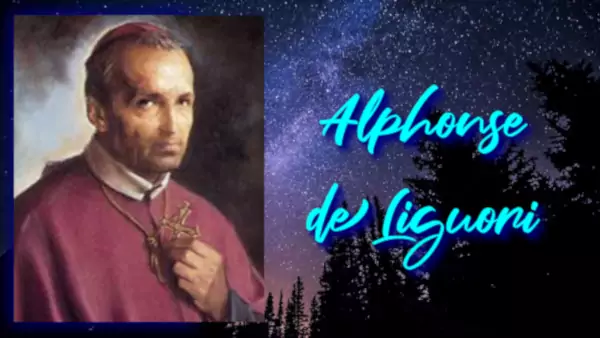1 August - Alfonse was born on 27 September 1696 in Marianella, a suburb of Naples. On the following September 29th he is baptized in the church of Santa Maria dei Vergini and receives the baptismal names of Alfonse, Mary, Anthony, John, Francis, Cosme and Damien, Michel and Gaspard.
Around 1702, Alphonse was six years old. Alphonse was educated by a Calabrian priest. He learns Latin, Greek, French, Spanish, Italian, history, mathematics, but also some notions of physics. A few years later, another tutor introduces Alphonse to philosophy, then to painting, architecture... He learns music from Gaetano Greco and plays the harpsichord. Alphonse's spiritual formation was given at the age of seven by a director of conscience, Father Thomas Pagano. It is with him that he makes his first communion at the age of nine.
Alphonse continued his studies at the University of Naples with a view to a career as a lawyer. At the age of thirteen, in October 1708, he passed the entrance exam. At the age of seventeen he finished studying law and passed his doctorate, with a dispensation, the statutory age being set at twenty-one. He was an assistant to two lawyers. It was only at the end of this training period that he was able to wear the toga. At about the age of nineteen or twenty, he began his work as a lawyer. Alphonse wrote a personal code of conduct as a lawyer, in reaction to the corruption of the Neapolitan justice system, which showed a very high ideal of integrity.
Around the year 1722, when he was twenty-six years old, he began to frequent the world constantly, neglecting prayer and pious practices and taking pleasure in the attention with which he was received everywhere.
During Holy Week 1722, Alphonse made a retreat that left a deep impression on him, leading him to change his behaviour. He went to communion several times a week, went to confession regularly and developed a devotion to Eucharistic adoration. It was during this retreat that Alphonse made the decision to become a priest.
The following year, in 1723, Alphonse was at the height of his career. His family relations allowed him to be the lawyer of a resounding trial. The judgment was not favourable to Alphonse's clients, who were humiliated. Alphonse locks himself in his room for several days, refuses to eat, and no longer wants to be a lawyer. On August 28, 1723, the young lawyer left to perform a remarkable act of charity by visiting the sick at the Hospice des Incurables. Suddenly he finds himself surrounded by a mysterious light while the building seems to be wavering and an inner voice says to him: "Abandon the world and give yourself to me". Alphonse decides to dedicate himself to religious life. The decision to become a priest is not an easy one. Alphonse tells his father that he wants to be consecrated. His father tries to dissuade him from doing so and uses his relationships with religious. On October 23, 1723, the Cardinal of Naples, Francesco Pignatelli, accepted him as a candidate for the priesthood, and Alphonse donned the ecclesiastical habit. The radical change of life surprises many people who see in it a depression of Alfonse following the loss of his trial.
Alphonse's formation remains very sketchy. Between 1723 and 1726, he studied theology with three priests. On September 25, 1724, one year after being admitted as a candidate for the priesthood, Alphonse received the tonsure. He received minor orders and the sub-diaconate in September 1725. On April 6, 1726, he became a deacon, and on December 21 of the same year, at the age of thirty-one, he was ordained a priest.
The first three years of his priesthood were marked by a desire to withdraw. Nevertheless, he changed his mind and turned to an active apostolate. Alphonse studies in order to be able to confess, he obtains the last theological examination and preaches regularly. Alphonse preaches using simple language, fleeing from all turns or stylistic effects. Although coming from the nobility, Alphonse chooses to take care of the poorest, the lazzari, the proletarians of Naples, he approaches the sick in the hospital of the Incurables of Naples. On November 9, 1732, he founded the "Congregation of the Most Holy Redeemer". In 1762, at the age of 64, he became a bishop. Finally, on August 1, 1787, as the Angelus of noon rang, Alphonse de Liguori peacefully received his reward. He had almost finished his ninety-first year. Beatified in 1816 by Pope Pius VII, Alphonse de Liguori was canonized in 1839 by Pope Gregory XVI. In 1871 Pope Pius IX proclaimed him Doctor of the Church.








